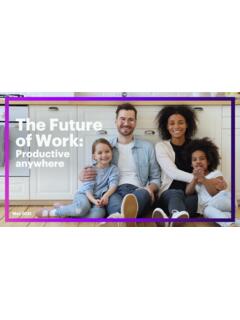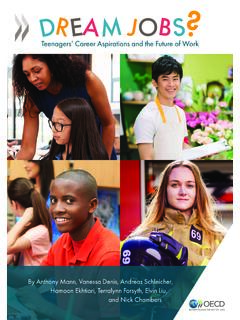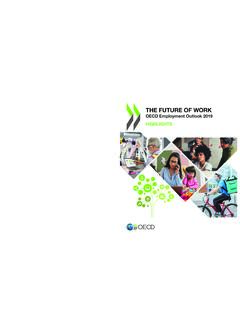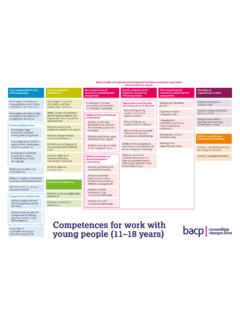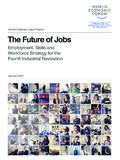Transcription of The Fourth Industrial Revolution (4IR) and the Skill Needs ...
1 The Fourth Industrial Revolution (4IR) and the Skill Needs for the future of Work One of the key strategic measures to address the transformative impact of the Fourth Industrial Revolution , is preparedness for the future of work. In a short space of time from now, more than one-third of the skills that are believed to be essential for today's workforce will have changed according to the future of Jobs Report from the World Economic Forum (WEF, 2018). On-going rapid technological innovations will mean that people will be sharing workplaces with artificial intelligence platforms and bots. To stay ahead of the curve, one Needs to commit to lifelong learning so as to acquire and sustain relevant skills-sets required to succeed in the ever-changing workplace of the future . Some of the skills-sets identified in this regard include: 1. Creativity Franken (1993) describes creativity as the tendency to generate or recognise ideas, alternatives, or possibilities that may be useful in solving problems, communicating with others, and entertaining ourselves and others' (p.)
2 396). Human workers in the future will need to be creative to fully realise the benefits of all the new things for the future new products, ways of working and technologies. Robots currently can't compete with humans on creativity. The future workplace is going to demand new ways of thinking, and human creativity is the key to it. 2. Emotional intelligence (EQ). A person's ability to be aware of, control and express their own emotions as well as being cognisant of the emotions of others describes their emotional intelligence. An individual is considered as exhibiting high emotional intelligence if he/she has empathy, integrity and is able to work well with others. A machine cannot easily replace the ability of a human being to connect with another human being, so those who have high EQs will be in demand in the workplace of the future 3. Analytical (critical) thinking A person with critical thinking skills can suggest innovative solutions and ideas, solve complex problems using reasoning and logic and evaluate arguments.
3 The first step in critical thinking is to analyze the flow of information from various resources. After observing, someone who is a strong analytical thinker will rely on logical reasoning rather than emotion, collect the pros/cons of a situation and be open-minded towards the best possible solution. People with strong analytic thinking capabilities will be needed to navigate the human/machine collaboration continuum for improved labour productivity. 4. Active learning with a growth mind-set Individuals in the future of work era need to actively learn and grow. A person with a growth mind-set understands that their abilities and intelligence can be developed, and they know their effort to build skills will result in higher achievement. They will, therefore, take on challenges, learn from mistakes and actively seek new knowledge. 5. Judgment and decision making Human decision-making will become more complex in the future workplace.
4 While machines and data can process information and provide insights that would be impossible for humans to gather, ultimately, a human will need to make the decision recognising the broader implications of such decision on other areas of business, personnel and the effect on 1. other more human sensibilities such as morale. As technology takes away more menial, routine and mundane tasks, it will leave human beings to engage with higher-level decision- making. 6. Interpersonal communication skills The ability to exchange information and meaning between people will be a vital Skill during the 4th Industrial Revolution . This means people should hone their ability to communicate effectively with other human beings so that they are able to say the right things, using the right tone of voice and body language, in order to bring their messages across. 7. Leadership skills Traits commonly associated with leadership such as; being inspiring and helping others become the best versions of themselves, will be necessary for the future workforce.
5 While today's typical organisational chart might not be as prevalent, individuals will be required to take on leadership roles within project teams or work with other employees to tackle issues and develop innovative solutions. As such, these individuals should show an ability to identify talent and to motivate and deploy such talent in the right manner to achieve the expected results. 8. Diversity and cultural intelligence As our world and workplaces become more diverse and open, it is vital that individuals have the skills to understand, respect and work with others despite differences in race, culture, language, age, gender, sexual orientation, political or religious beliefs, etc. The ability to understand and adapt to others who might have different ways of perceiving the world will not only improve how people interact within the company but is also likely to make a company's products and services, more inclusive and successful.
6 9. Technology skills The 4th Industrial Revolution is fuelled by technological innovations such as artificial intelligence, big data, virtual reality, blockchains, and more. This means that everyone will need a certain level of comfort around technology. At the most basic level, employees in most roles will be required to access data and determine how to act on it. This requires some technical skills. On a more fundamental level, everyone Needs to be able to understand the potential impact of new technologies on their industry, business, and job. 10. Embracing change Due to the speed of change in the future workplace, people will have to be agile and able to embrace and celebrate change. Not only will our brains need to be flexible, but we'll also need to be adaptable as we are required to adjust to shifting workplaces, expectations, and Skill -sets. An essential Skill during the 4th Industrial Revolution will be the ability to see change not as a burden but as an opportunity to grow and innovate.
7 At CUT, a lot of work has already been done by developing core curriculum that covers most of these skills for students. This is evident in the graduate attributes. However, this does not involve only students, employees are also affected by the dynamics of the 4IR and the resultant changes to the contemporary workplace. Moreover, the way these skills are been taught should be carefully thought through so that they can result into hands-on experiences and not theoretical knowledge. 2. Adopted from Bernard Marr (2019), Artificial Intelligence in Practice. How 50 Successful Companies Used Artificial Intelligence to Solve Problems, Wiley. Taskforce on 4IR+CE. 3.


